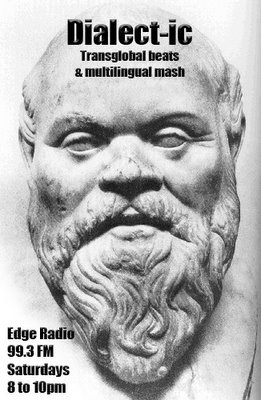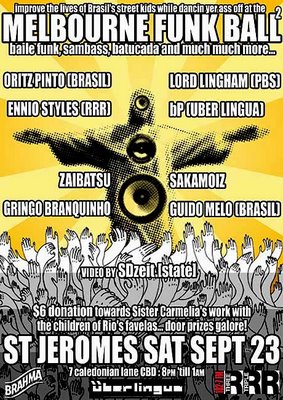Monday, September 11, 2006
Sunday, September 10, 2006
hype :: Filastine
 Filastine in an alley post-show, kind of dirty, w/ rare flamethrower attachment.
Filastine in an alley post-show, kind of dirty, w/ rare flamethrower attachment.Filastine is da man!
Make him your friend at www.myspace.com/filastine, order his album for $10 at www.postworldindustries.com
Then download mixes and these field recordings at www.filastine.com:
hype :: Florida 2000 Club in Kakuma, Kenya
 "Some of the people living in the [Kakuma] camp, such as the “lost boys” of Sudan have been there for ten years." (caption&photo courtesy Senator Amanda Vanstone)
"Some of the people living in the [Kakuma] camp, such as the “lost boys” of Sudan have been there for ten years." (caption&photo courtesy Senator Amanda Vanstone)Creak, creak, creak. tizzle, tizzle, pop!
The noisy roof of 'the club' is a corrugated-tin chorus of groans and feeble protests against the intense noon heat. Metallic pings punctuate the sleepy midday silence at Kakuma refugee camp in the northwest corner of Kenya. Most of the 60,000 refugees take siesta, under the UN-blue
plastic canopy they are given for makeshift shelters. The heat swelters...
There, the music sounded different - special. Alive. The hot corrugated roof redirected sound waves in myriad ways. The noise from its relentless expansion and contraction added to the strange physics of the place. It was the music though, which had its own quantum. Music was everything. Political - it was oxygen in 4/4 time.
Some of the refugees at the camp were Ethiopian and had studied abroad in 'friendly' countries like Angola, Cuba, China and Russia. They knew the songs of Cuba's Silvio Rodríguez, like his songs for the guerrilleros - resistance fighters - in El Salvador. Others hooped and hahed at
the chutzpah of Fela Kuti's Afrobeat. And they loved reggae. Its chaka-chaka sound picked up by Nairobi mavericks singing in sheng, the Kenyan rhyming slang. Artists like Alpha Blondy from Côte d'Ivoire and South Africa's Lucky Dube were on heavy rotation. Here under the creaky roof of 'the club', right in the middle of one of East Africa's largest refugee camps, where people found some respite. The music had everything to do with it. Combined with the harsh heat and light, like an impressionistic Ethiopian Haile Gerima film, the music and the lyrics shifted dimensions, slowed down time and cued the occasional cool breeze from distant mountains.
It was many years ago - and yet I can still hear those sounds. The creaks and pops of metal roofs expanding under the sun and contracting again in the cool desert night air, like the ebb and flow of tides, were part of the daily acoustics of life. But so too was the music and the animated talk in 50 tongues.
On any given evening, walking out into the various 'neighbourhoods', one could almost forget that this was a refugee camp. Years of war, uncertainty and diplomatic failures had kept tens of thousands of people from Ethiopia, Sudan, Rwanda, Burundi and Zaire living in limbo out in the
Kenyan desert frontier. Unable to return home, the people had no choice but to build a life for themselves in their new barren surroundings. Thanks to a strong community-support structure, DIY resourcefulness and ingenuity, they built up their temporary shelters and converted them into viable longer-term housing and collective spaces.
One of the first communal places to be built was the Florida 2000, 'the club' humorously named after a famous Nairobi haunt. Much like its namesake, the local Florida 2000 was a vibrant place. People could have 'WFP beer' - a drink cheekily brewed from World Food Programme sorghum rations - and boogie down to the latest Lingala music from Zaire (now the Democratic Republic of Congo). A flexible barter system ensured that people with no money could still afford the occasional WFP beer in exchange for either some special labour or surplus rations. Sometimes they didn't have to pay at all. It was like that. In a world straight out of a Mad Max set, the Florida 2000 was a life-raft in a sea of despair. And the soundtrack was there, energizing the place from a tinny box which filled the cavernous voids of despair with an enthusiasm for life.
Life wasn't paradise in the camp by any stretch of the imagination. Unbearable heat, scorpions and deadly hand-sized camel spiders, regular visits from bazooka-toting militias from the Sudan People's Liberation Army, disease, boredom and sometimes violent rivalries within the camp
were common. Nonetheless a small communal hut and a beat-up old Russian cassette player, churning out the latest Ethiopian pop hits or reggae classics, transformed people's lives. I remember one friend - Walter from Kigale, a regular at the Florida 2000 - told me that the way he saw it, food and medicine enabled him to survive but it was music which made him feel truly alive. He'd swing to Milimani Park Orchestra and Kofi Olomide and you knew, for a brief moment, he wasn't weighed down by stones of despair.
Something about the setting, the circumstance, the people and the sounds all combined to make an impression on my life that endures to this day. That these people whose families were murdered, homes destroyed, and lives ruined could come together and have a moment of happiness through song tells us something both about the strength of the human spirit and
the transformative power of music...
read the rest of this story 'Politics With Soul' by Adam Ma'anit published in New Internationalist (2003) at www.newint.org/issue359/keynote.htm


